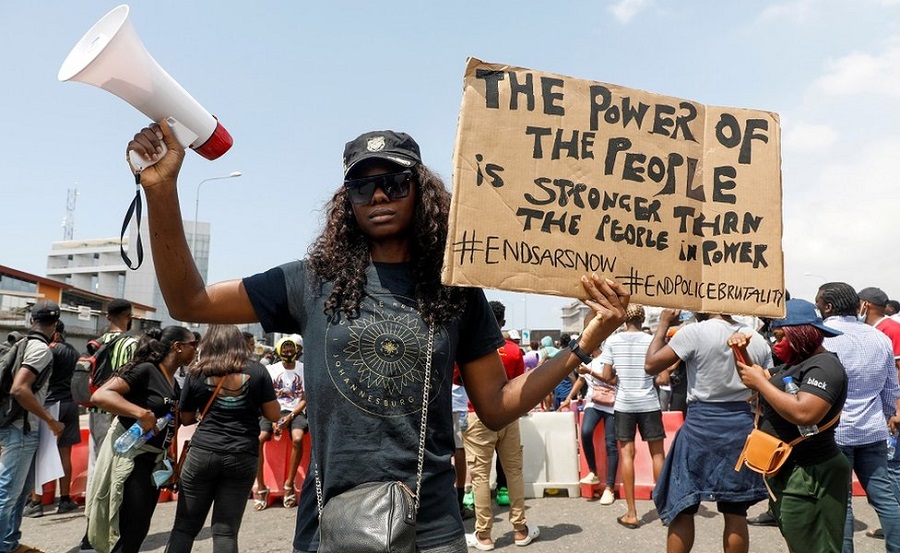Editorial
#EndSARS And UK Parliament’s Reactions

The nationwide #EndSARS protests may seem to have mellowed out, but the probable consequences for the killings, maimings and massacres of defenceless demonstrators may linger as the dastardly act receives considerable attention by the United Kingdom (UK) government.
On November 23, 2020, the British Parliament debated a petition seeking to sanction the Nigerian government and the nation’s security agents over alleged gross human rights abuses during the #EndSARS protests across the country.
The UK’s new Global Human Rights sanctions regime under the Sanctions and Anti-Money Laundering Act 2018, gives Britain the powers to question those involved in serious human rights violations or abuses. The sanctions regime does not target countries but individuals involved in serious rights violations or abuses around the world.
In an outright condemnation of police brutality and killing of unarmed protesters, members of the United Kingdom Parliament unanimously called for selected sanctions against Nigerian government officials and military officers who participated in human rights violations during the #EndSARS protests.
The debate which was based on an e-petition calling for sanctions against the Nigerian government signed by over 220,000 signatories, crossing the 100,000 mark needed for a petition to be debated by the lawmakers, was backed by all parliamentarians when it was deliberated at the Westminster Hall. Members condemned the UK government for standing neutral while the Nigerian government violated young protesters.
Citing the shootings at Lekki in Lagos, Oyigbo in Rivers and Delta States respectively as well as the unjust victimisation of protesters after the protest and the freezing of protesters’ accounts, the parliamentarians described President Muhammadu Buhari’s administration as nothing short of a dictatorship.
Members of Parliament (MPs) spent time, particularly condemning the violence that erupted at the Lekki toll gate in Lagos and insisted that Nigerian officials and their family members should not enjoy in the UK the liberties and privileges they deny their citizens at home.
Recall that in October this year, thousands of Nigerians took to the streets, calling for an end to police brutality and extra-judicial killings by the Special Anti-Robbery Squad (SARS). Protests in Lagos turned bloody when soldiers confronted peaceful protesters at the Lekki toll gate and Alausa, killing at least 12 people.
The question is, was the Nigerian government given prior notice of the case and allowed to state its side in line with due process and fair hearing? We may only assume so. This accords with natural justice which requires that no one should be penalised by decisions affecting one unless one has been notified of the matter and allowed to present one’s case.
Nevertheless, we hail the decision of the British Parliament for the members’ bold stand. It only shows that no country is an island on its own. Since Nigeria is part of the global community, whatever happens in this country could affect the world. We only hope that the action of the British parliamentarians would serve as a warning to the Federal Government that its undemocratic actions are closely watched and monitored by the global community.
Just as the members of Parliament, Nigerians are equally concerned about the human rights abuses perpetrated by the Nigerian security operatives and attempts by the government to cover up these abuses and to clampdown on peaceful protesters who were only on the streets to demand a better government.
We strongly urge the UK government to keep pressuring its Nigerian counterpart and its security services to uphold human rights and the rule of law as well as investigate all incidents of brutality, illegal detentions and the use of excessive force to hold those responsible to account.
October 20, 2020, will always be remembered for the Lekki toll gate massacre, the day a deliberate and coldly calculated attack on peaceful Nigerians was executed by the Nigerian Army. The Nigerian government has since taken part in an attempted cover-up of the massacre while security agents make muted responses to the murder of protesters.
Unfortunately, despite the declaration by the Federal Government that SARS had been disbanded, the corruption and brutality of the security forces continue unabated while the government’s violence against its citizens appears only to be intensifying. Also, the authorities need to stop freezing the bank accounts of key protesters and illegally detaining them.
The UK authorities should take this opportunity to look beyond sanctions into how development fundings are spent in Nigeria. Britain has expended more than £10 million in aid to Nigeria and on programmes from which various police units benefited from. We equally ask the UK authorities to redirect aid to poverty relief and anti-corruption programmes in Nigeria.
Since it is the government that can sanction, not Parliament, which can only make resolutions, we prod the British government to immediately act on the recommendations of the lawmakers. Furthermore, it is expedient for Great Britain to collaborate with local and international civil society groups to support justice, accountability and a more responsive policing model in Nigeria.
Editorial
As NDG Ends Season 2

Editorial
Beginning A New Dawn At RSNC

Editorial
Sustaining OBALGA’s Ban On Street Trading

-

 News2 days ago
News2 days agoAmend Constitution To Accommodate State Police, Tinubu Tells Senators
-

 Politics2 days ago
Politics2 days agoSenate Urges Tinubu To Sack CAC Boss
-

 News2 days ago
News2 days agoDisu Takes Over As New IGP …Declares Total War On Corruption, Impunity
-
Business3 days ago
President Tinubu Extends Raw Shea Nuts Export Ban To 2027
-
Business3 days ago
Crisis Response: EU-project Delivers New Vet. Clinic To Katsina Govt.
-
Business3 days ago
President Tinubu Approves Extension Ban On Raw Shea Nut Export
-
Sports3 days ago
NDG: Rivers Coach Appeal To NDDC In Talent Discovery
-
Rivers2 days ago
Etche Clan Urges Govt On Chieftaincy Recognition

